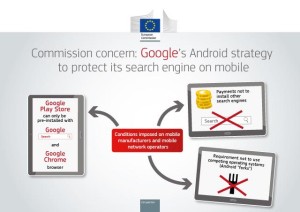| May 2, 2016 Here are some of the developments in antitrust news this past week that we found interesting and are following. AB InBev to Sell More SAB Assets as Seeks EU Deal Approval. Brewing giant Anheuser-Busch InBev plans to sell the eastern European assets of SABMiller, which could fetch almost $8 billion, as it seeks European regulatory approval for its $100 billion-plus takeover of its closest rival. AB InBev has already lined up Japan’s Asahi Group Holdings to buy SABMiller’s Grolsch, Peroni and Meantime brands for 2.55 billion euros ($2.90 billion), and said on Friday it had put up for sale SABMiller’s business in Czech Republic, Hungary, Poland, Romania and Slovakia. AB InBev, maker of Budweiser and Stella Artois, has barely any business in eastern Europe outside Russia and Ukraine, so analysts say the sale is more about preventing regulatory delays and exiting weak spots than ensuring market competition. Regulators Approve Charter Communications Deal for Time Warner Cable. Federal regulators have moved to approve Charter Communications’ $65.5 billion acquisitions of Time Warner Cable and Bright House Networks, enabling the creation of a new cable giant as the industry focuses more on broadband as traditional TV declines. However, the orders to approve the deals are coupled with many restrictions that illustrate how regulators are increasingly using their power to further policy goals that are not covered by current regulations for the industry. The Federal Communications Commission and Justice Department imposed mandates on the acquisitions aimed at protecting streaming video companies and providing cheaper broadband services to low-income families, some of which go far beyond regulations for the entire cable and Internet sectors. Markit, ISDA Offer Concessions to Settle EU Antitrust Charges. The European Commission has revealed that Data company Markit and trade body ISDA have offered concessions in a bid to settle EU antitrust charges and stave off possible fines. The competition authority three years ago charged the two companies and 13 banks with blocking Deutsche Boerse from the lucrative credit derivatives market in 2007 and the Chicago Mercantile Exchange in 2008. The Commission dropped the banks from the case in December because of insufficient evidence but Markit and the International Swaps and Derivatives Association, which represents firms involved in the derivatives market, remained in its sights. Leave a comment » Categories: Antitrust Enforcement, Antitrust Litigation, International Competition Issues April 25, 2016 Here are some of the developments in antitrust news this past week that we found interesting and are following. EU Regulators Set to Warn Halliburton on Baker Hughes Deal: Sources. European Union antitrust regulators are planning to warn U.S. oil industry services group Halliburton Co that its plan to buy Baker Hughes will hurt competition, according to sources. The move would add to Halliburton’s woes after the U.S. Justice Department filed a lawsuit this month to stop the deal because the combined company would only compete with Schlumberger NV in 20 business lines in the global well drilling and oil industry construction services industry. Such a warning typically means the EU watchdog is poised to block a merger unless companies provide concessions to address its concerns. Microsoft and Google Agree to Drop Mutual Complaints. Microsoft and Google have agreed to withdraw complaints against each other with regulators around the world, as the two American tech giants continued recent efforts to settle the once-bitter conflicts between them. The two companies also said they would try to resolve future squabbles before complaining to regulators, as they have in the past. Trading Start-Up Files Antitrust Lawsuit in New York. Derivatives trading start-up TeraExchange has filed an antitrust lawsuit in the U.S. District Court for the Southern District of New York alleging that some of the biggest banks in the world conspired to block customers from using its service. The suit charges that 12 banks conspired to keep investors from trading interest rates swaps on its platform, which was founded in 2010. Bank of America Merrill Lynch, Barclays, BNP Paribas, Citigroup, Credit Suisse, Deutsche Bank, Goldman Sachs, HSBC, JP Morgan, Morgan Stanley, RBS and UBS were named in the suit. Glaxo, Other Drug Makers Appeal UK Fines for Pay-to-Delay Deals. GlaxoSmithKline is appealing a $54.5 million fine that was recently levied by UK regulators for illegally conspiring with several generic rivals to delay marketing of a lower-cost version of its Paxil antidepressant. The generic manufacturers were also fined a total of about $7 million and are appealing those decisions, as well. The appeals come two months after the UK Competitions and Market Authority found that between 2001 and 2004, Glaxo made payments totaling about $72 million to several generic companies as part of a settlement to end patent litigation that was filed by Glaxo against the generic drug makers. In its appeal, Glaxo argued that the UK regulators failed to prove the deals restricted competition and that its own tactics did not constitute abuse of a dominant position in the market for antidepressants. Leave a comment » Categories: Antitrust Enforcement, Antitrust Litigation, International Competition Issues April 20, 2016 
A View from Constantine Cannon’s London Office By Richard Pike and Yulia Tosheva Just as expected, following a one-year investigation and a number of information requests, the European Commission formally announced today that it is accusing Google’s parent company, Alphabet, of abusing its dominant position in relation to the Android mobile operating system. Google is already facing antitrust charges from Brussels over promoting its own shopping service in online searches. The stakes seem higher for Google in the Android case, however, as it made about $11 billion last year from advertising sales on Android phones through its apps such as Maps, Search and Gmail, according to estimates by financial analyst Richard Windsor.[1] About 80% of smartphones and tablets globally run on Android.[2] 
click here for more » Leave a comment » Categories: Antitrust Enforcement, International Competition Issues April 4, 2016 Here are some of the developments in antitrust news this past week that we found interesting and are following. FTC Accuses Endo, Other Drugmakers of Antitrust Violations. The Federal Trade Commission has accused several drugmakers of violating antitrust laws by agreeing to delay the U.S. launches of cheaper generic versions of two popular pain treatments. It’s the first so-called “pay for delay” case brought by the FTC in which a drug’s original maker agreed not to sell its own “authorized generic” version until well after a generic drugmaker began selling its product. These arrangements guaranteed the generic drugmakers would have no competition, and so could keep prices high, for at least six months. The FTC alleges Endo Pharmaceuticals Inc., maker of Opana ER pain pills and the Lidoderm pain patch, paid Impax Laboratories Inc. and Watson Laboratories Inc., respectively, to delay selling their approved generic versions. Uber CEO must face price-fixing lawsuit by passengers -U.S. judge. Uber CEO Travis Kalanick failed on Thursday to win the dismissal of an antitrust lawsuit accusing him of scheming to drive up prices for passengers who use the popular ride-sharing service. U.S. District Judge Jed Rakoff in Manhattan said Kalanick must face claims he conspired with drivers to ensure they charge prices set by an algorithm in the Uber smartphone app to hail rides, including “surge pricing” during periods of peak demand. The plaintiffs claim that drivers conspired with Kalanick to charge fares set by the algorithm, with an understanding that other Uber drivers would do the same, even if they might fare better acting on their own. China antitrust proposals trigger foreign business fears over IP protection. Foreign companies with dominant market positions could be increasingly forced to license technology to competitors or face sanctions under China’s latest draft antitrust policy guidelines, according to foreign business groups and attorneys. The proposals include a so-called “essential facilities” doctrine, which assumes some core infrastructure and technology is so important, or the barriers to entry so high, that refusal to share constitutes monopolistic behavior. If interpreted broadly, China’s antitrust policy could force companies to license their intellectual property to Chinese competitors or lower licensing costs to benefit local firms, at a time when China is seeking to promote domestic champions. EU Opens In-Depth Investigation Into Hutchison, Vimpelcom Italian Deal. European Union antitrust regulators have opened an in-depth investigation into Hutchison’s planned merger of its Italian mobile telecoms business with Vimpelcom’s, on concerns it could lead to higher prices for consumers. “The Commission has concerns that the transaction could lead to higher prices, less choice and reduced innovation for mobile customers in Italy,” the European Commission said in a statement on Wednesday. Leave a comment » Categories: Antitrust Enforcement, Antitrust Litigation, International Competition Issues April 1, 2016 
A View from Constantine Cannon’s London Office By Yulia Tosheva and Irene Fraile The UK Payment Systems Regulator (“PSR”) has published a final guidance on its approach to monitoring compliance with the EU Interchange Fee Regulation (“IFR”), which is changing the way payment systems operate in Europe. The PSR, which was launched in April 2015, is an independent economic regulator that oversees the UK payments industry. The PSR is the first regulator of its kind in the world. The final guidance, which was issued on March 24, 2016, is of particular interest to payment card schemes, banks and merchants as it is the first document to shed light on the practical application of the IFR in the UK. In view of the maturity and importance of the UK payment systems industry (currently valued at £75 trillion), the PSR’s guidance may assist other EU regulators in their implementation of the IFR. It contains detailed provisions on the powers of the PSR to conduct investigations and to give directions, information-gathering, dispute resolution, and penalties for non-compliance. click here for more » Leave a comment » Categories: Antitrust Enforcement, International Competition Issues « Previous Entries Next Entries » | | | |


